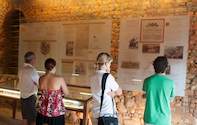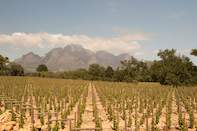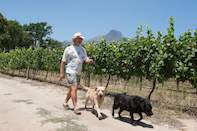A neuro-psychologist gathers archaeologists, historians, musicians and farm workers on his 17th-century wine farm, Solms-Delta to tell their stories, uncut. It’s a revelation.
A Discovery

Next to the Dwars River at the heart of the Drakenstein Valley lies Solms-Delta farm, a remarkable place developed by a remarkable man. Neuro-psychologist Mark Solms, from the South African branch of a German family with viticultural roots in Rheinhessen, has dedicated himself to telling the story of this particular wine farm and its people as a microcosm of life in the Cape winelands.
And, quite by chance, this man’s questing nature has led to the unearthing of rare finds that span millennia, resulting in the creation of a multicultural centre of a long-overlooked winelands community’s history in just five years after the project was started.
The ongoing story is told at the Museum van de Caab, your first stop after driving down a dusty road among vineyards thriving in the ancient riverbed upon which the farm lies.
Wine was last made here about a century ago and the museum is housed in a section of the 1740 cellar. Its earthen floor, walls of exposed river cobbles and red clay brick, and low wood-beamed ceiling are the backdrop to a fascinating depiction of the farm’s history through meticulous professional research, artefacts and oral histories.
It started in the vineyards with the discovery of Late Stone Age artefacts as new vines were being planted in the early 2000s after Mark Solms bought the property. The stone tools, about 1 200 in number, proved the presence of early mankind here, much as pottery shards provided evidence of subsequent settlement by indigenous communities on the same site several thousands of years ago.
A Retelling

The research grew to involve University of Cape Town archeology teams and resident young historian Tracey Randle, who set up the excavation site of an early colonial abode between the tasting room and the 1831 gabled manor house, now home to the Solms family.
Above all, the museum presents not only details of the farm’s French Huguenot and Cape Dutch colonial owners, but a rare and complete record of its slaves, farm workers and other oppressed descendants of local indigenous communities. The intertwining of their lives is most tellingly revealed in proof that the property’s second private owner, Christoffel Snijman, was the son of a slave woman.
When Solms came to the farm, it was the soil type and the hot, dry Mediterranean conditions that persuaded him and viticulturist Paul Wallace to focus on Rhône varieties (Shiraz, Mourvèdre, Grenache and Viognier), continue working with traditional Cape grapes (Chenin Blanc, Clairette Blanc, Sémillon, Pinotage, Muscat d’Alexandrie and Muscat de Frontignan) and vinify some unusual types (Primitivo, Tannat and Touriga).
In some cases, the ancient Roman and Greek method of pinching the bunch stem to concentrate berry flavour while retaining natural acidity, effectively producing desiccated grapes for vinification, has been revived to acclaim.
Mark Solms’ dedication to redressing historical inequalities and misconceptions and creating a new, integrated community with a shared past on Solms-Delta is evident wherever you go.
The property comprises three separate wine farms: the home farm Delta, owned by Solms; neighbouring Lubeck, owned by British friends and renowned philanthropist Richard Astor and family; and Lekkerwijn, owned by the Wijn de Caab Workers’ Trust with shareholding by the 200 people living and working here.
The vineyards of all three are farmed and managed as a single unit and wines are made in a small, modern cellar with experienced vintner Hilko Hegewisch initially consulting, succeeded over the past decade by several up-and-coming young winemakers.
Sadly, towards the end of 2018, financial difficulties (exacerbated by 2020 and 2021 Covid lockdown restrictions including bans on alcohol sales) forced the three trusts to place Solms-Delta under business rescue, hoping to avoid liquidation and turn the business around.
An attempt was made by signing up for the national government Department of Rural Development and Land Reform’s ‘Strengthening the Relative Rights of People Working the Land’ (SRR 50:50) programme. It involves a loan to encourage land owners to give a half-share of their land to farm employees with help from a state-sponsored loan.
However, in the Solms-Delta case (where employees already owned a third), subsequent state withdrawal of funding intended to up this to a half, avoid liquidation and secure the ongoing ownership and employment of all living and working on the property, has left the land now partly owned by government and the farm in limbo.
A Microcosm of Cape Culture

In the meantime, despite being in a state of flux, the members of the three trusts have continued to keep the farm operational, welcoming visitors to the restaurant and museum and providing a venue for special functions. Harvesting has continued, but winemaking has been limited.
So wine lovers will find the wine list (with names in the local community’s home language of Afrikaans evoking the joie de vivre associated with sharing good food, wine and song) somewhat diminished and in some cases no new vintages of a particular wine available for tasting and sale.
These include the formerly highly rated flagship Africana (a Shiraz from desiccated grapes); Hiervandaan (a Shiraz-based blend); and Amalie (a white blend of varieties such as Roussanne, Viognier and Grenache Blanc).
History is everywhere at Solms-Delta, and even the Fyndraai Restaurant boasts an excavation site, eye-catchingly incorporated beneath the glass-panelled floor. The restaurant’s main purpose, though, is to serve indigenous Cape foods, traditionally influenced by the sweet and spicy cuisine of the Dutch East Indies.
You can enjoy the likes of bobotie (a curried meat dish), curried prawns, smoked snoek (fish) and samoosas indoors, outdoors beneath the trees, from a picnic basket in the riverside forest, or at a summer sunset concert overlooking the vineyards.
Performances range from talented local jazz and soul bands to community dance troupes showcasing traditional Cape styles (with visitors welcome to join in the song and dance.)
The Dik Delta Culinary Garden has been established on some two hectares with the help of Khoi food culture expert Renata Coetzee, ethno-botanist Alan Sonnenberg and heritage expert Hein Joubert.
They have re-introduced trees, shrubs and plants producing fruit and herbs used for nourishment and cures by the region’s original Khoi (Khoe) and San inhabitants, from wild grape, rosemary, mint, asparagus and olive to the edible seeds of the huilboerboon tree.
Chef Shaun Schoeman, a local lad who explored his own heritage by delving into the use of indigenous ingredients to add to his experience with contemporary fusion cuisine at top Cape eateries, makes a preserve from the makataan wild watermelon, sauces with buchu buttermilk and salads containing spekboom leaves, with honeybush tea as an alternative to the well-known indigenous Rooibos.
Solms-Delta wine tastings and garden, cultural and history tours, always informal, are enriched by the presence of a guide, who will invariably have familial or ancestral links to the farm.
 This mountain-ringed valley’s celebrated French character comes from the Huguenots, refugee French Protestants who settled here during the...
This mountain-ringed valley’s celebrated French character comes from the Huguenots, refugee French Protestants who settled here during the...